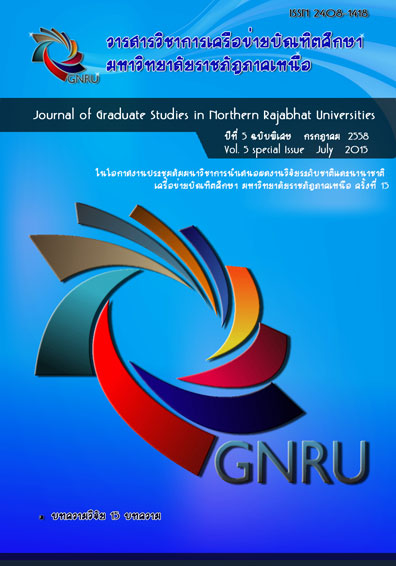การพัฒนากิจกรรมการจัดประสบการณ์การเรียนรู้โดยใช้สมองเป็นฐานที่มีต่อการเรียนรู้วิทยาศาสตร์สำหรับเด็กปฐมวัยชั้นอนุบาลปีที่ 2 โรงเรียนบ้านวังกวาง; The Development of Brain–Based Learning Activities on Science for Early Childhood Students Ban wangkwang schoo
Main Article Content
Abstract
บทคัดย่อ
การวิจัยในครั้งนี้มีจุดมุงหมายเพื่อพัฒนากิจกรรมการจัดประสบการณ์การเรียนรู้โดยใช้สมองเป็นฐาน ที่มีต่อการเรียนรู้วิทยาศาสตร์สำหรับเด็กปฐมวัย โดยดำเนินการตามขั้นตอนของการวิจัยและพัฒนา ( Research and Development ) ซึ่งแบ่งออกเป็น 3 ขั้นตอนดังนี้ ขั้นตอนที่ 1 การสร้างและหาดัชนีประสิทธิภาพของกิจกรรมการจัดประสบการณ์การเรียนรู้โดยใช้สมองเป็นฐาน ที่มีต่อการเรียนรู้วิทยาศาสตร์สำหรับเด็กปฐมวัยชั้นอนุบาลปีที่ 2 โรงเรียนบ้านวังกวาง ผู้วิจัยได้ศึกษาแนวคิดทฤษฏี หลักการสร้างกิจกรรมการจัดประสบการณ์การเรียนรู้โดยใช้สมองเป็นฐาน จากนั้นสร้างกิจกรรมจำนวน 15 เรื่อง ตรวจสอบความเหมาะสม ปรับปรุงแก้ไข แล้วนำไปทดลองกับเด็กปฐมวัยชั้นปีที่ 2 ขั้นตอนที่ 2 เปรียบเทียบการเรียนรู้วิทยาศาสตร์ของเด็กปฐมวัยก่อนและหลังการจัดกิจกรรมการจัดประสบการณ์การเรียนรู้โดยใช้สมองเป็นฐาน และศึกษาระดับความสุขในการเรียนรู้ของเด็กปฐมวัยหลังการจัดกิจกรรมการจัดประสบการณ์การเรียนรู้ กลุ่มตัวอย่างที่ใช้ในการทดลอง ได้แก่เด็กปฐมวัยชั้นอนุบาลปีที่ 2 จำนวน 24 คน ซึ่งได้มาโดยการเลือกแบบเจาะจง เครื่องมือที่ใช้ได้แก่ แบบวัดการเรียนรู้วิทยาศาสตร์สำหรับเด็กปฐมวัย แบบวัดระดับความสุขในการเรียนรู้ ขั้นตอนที่ 3 ศึกษาความคิดเห็นของเด็กปฐมวัยที่ได้รับการจัดกิจกรรมการจัดประสบการณ์การเรียนรู้โดยใช้สมองเป็นฐานที่มีต่อการเรียนรู้วิทยาศาสตร์สำหรับเด็กปฐมวัย วิเคราะห์ค่าเฉลี่ย ค่าส่วนเบี่ยงเบนมาตรฐาน การทดสอบ Wilcoxon Match – Pairs Signed-Rank Test และสังเคราะห์ข้อมูลด้วยวิธีการอุปนัย
ผลการวิจัยพบว่า 1. กิจกรรมการจัดประสบการณ์การเรียนรู้โดยใช้สมองเป็นฐานที่มีผลต่อการเรียนรู้วิทยาศาสตร์สำหรบเด็กปฐมวัยชั้นอนุบาลปีที่ 2. มี 6 ขั้นตอน คือ 1) ขั้นผ่อนคลาย 2) ขั้นกระตุ้นการเรียนรู้ 3)ขั้นนำเสนอความรู้ใหม่ 4) ขั้นเรียนรู้ 5) ขั้นแลกเปลี่ยนเรียนรู้ 6 ) ขั้นสรุปการเรียนรู้ มีค่าความเหมาะสมอยู่ในระดับมากที่สุด (= 4.50, S.D. =0.49 ) และมีค่าดัชนีประสิทธิผลเท่ากับ 0.47 2. เด็กปฐมวัยชั้นอนุบาลปีที่ 2 มีการเรียนรู้วิทยาศาสตร์หลังจัดกิจกรรมสูงกว่าก่อนจัดกิจกรรมการจัดประสบการณ์การเรียนรู้โดยใช้สมองเป็นฐาน อย่างมีนัยสำคัญทางสถิติที่ระดับ .05 3. เด็กปฐมวัยชั้นอนุบาลปีที่ 2 ที่ได้รับการจัดกิจกรรมการจัดประสบการณ์การเรียนรู้โดยใช้สมองเป็นฐานที่มีต่อการเรียนรู้วิทยาศาสตร์มีความสุขอยู่ในระดับมาก
Abstract
The purpose of this study was to develop brain-based learning activities on science learning for early childhood. According to the research and development methodology which has 3 steps as follow: Step 1 : Creating and studying the effective index value of brain-based learning activities on science learning 5 experts examined the appropriate and experimented. Then experimented with 15 kindergarten 2 students at Banpangkue School to find the effective of the activities. Step 2: Implementing and studying the results toward brain-based learning activities on science learning for early childhood students. By comparison science learning of early childhood students before and after brain-based learning activities.Study the level of learning happiness after brain-based learning activities. The sampling group was 16 students kindergarten 2 at Banpakpad School. Step 3: Studying the early childhood students opinion of brain-based learning activities on science learning for early childhood students. The research instrument was the opinion interviewing form. The statistic which used were the average value, the standard deviation and Wilcoxon Match-Pairs Sighed-Rank Test
The result of the research revealed that: 1. Each brain-based learning activities on science learning for early childhood students had 6 steps: 1. To relax 2. To stimulate learning 3. The new knowledge 4. Learning 5. Learning Exchange and 6. Summary of learning. The evaluation results of the experts was at the highest level (=4.50, S.D.=0.49 ) and the effective index value is 0.74 2. The early childhood students have the science learinig after brain-based learning activities is higher than before at the significant .01. 3. The happiness level of early childhood students after brain-based learning activities on science learning is in the high level. 4. Most of early childhood students like brain-based learning activities and they want to study them again. The time and the instructional media were suitable.


